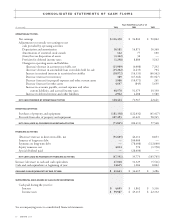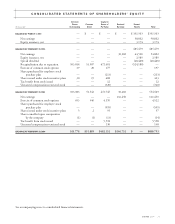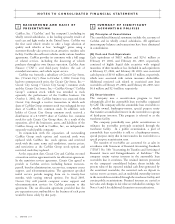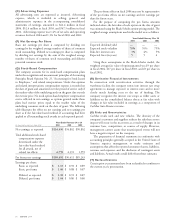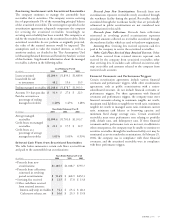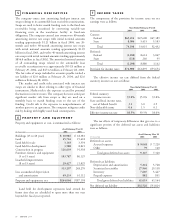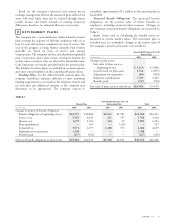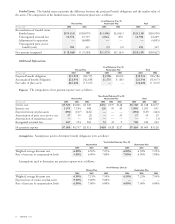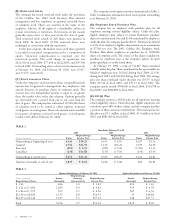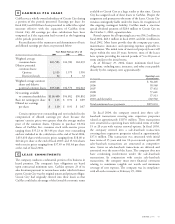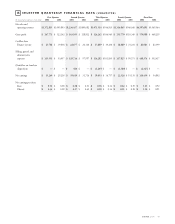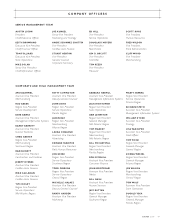CarMax 2004 Annual Report Download - page 39
Download and view the complete annual report
Please find page 39 of the 2004 CarMax annual report below. You can navigate through the pages in the report by either clicking on the pages listed below, or by using the keyword search tool below to find specific information within the annual report.
CARMAX
2004 37
Continuing Involvement with Securitized Receivables
The company continues to manage the automobile loan
receivables that it securitizes. The company receives servicing
fees of approximately 1% of the outstanding principal balance
of the securitized receivables. The servicing fees specified in the
securitization agreements adequately compensate the company
for servicing the securitized receivables. Accordingly, no
servicing asset or liability has been recorded. The company is at
risk for the retained interests in the securitized receivables. If the
securitized receivables do not perform as originally projected,
the value of the retained interests would be impacted. The
assumptions used to value the retained interests, as well as a
sensitivity analysis, are detailed in the “Key Assumptions Used
in Measuring Retained Interests and Sensitivity Analysis” section
of this footnote. Supplemental information about the managed
receivables is shown in the following tables:
As of February 29 or 28
(In millions)
2004 2003 2002
Loans securitized $2,200.4 $1,859.1 $1,489.4
Loans held for sale
or investment 48.2 19.6 13.9
Ending managed receivables $2,248.6 $1,878.7 $1,503.3
Accounts 31+ days past due $31.4 $ 27.6 $ 22.3
Past due accounts as a
percentage of ending
managed receivables 1.40% 1.47% 1.48%
Years Ended February 29 or 28
(In millions)
2004 2003 2002
Average managed
receivables $2,099.4 $1,701.0 $1,393.7
Credit losses on managed
receivables $21.1 $ 17.5 $ 12.9
Credit losses as a
percentage of average
managed receivables 1.01% 1.03% 0.93%
Selected Cash Flows from Securitized Receivables
The table below summarizes certain cash flows received from
and paid to the automobile loan securitizations:
Years Ended February 29 or 28
(In millions)
2004 2003 2002
•Proceeds from new
securitizations $1,185.5 $1,018.7 $755.7
•Proceeds from collections
reinvested in revolving
period securitizations $514.9 $ 468.9 $452.3
•Servicing fees received $21.5 $ 17.0 $ 13.8
•Other cash flows received
from retained interests:
Interest-only strip receivables $74.1 $ 65.4 $ 48.2
Cash reserve releases, net $16.6 $ 25.3 $ 15.8
Proceeds from New Securitizations. Proceeds from new
securitizations represent receivables newly securitized through
the warehouse facility during the period. Receivables initially
securitized through the warehouse facility that are periodically
refinanced in public securitizations are not considered new
securitizations for this table.
Proceeds from Collections. Proceeds from collections
reinvested in revolving period securitizations represent
principal amounts collected on receivables securitized through
the warehouse facility, which are used to fund new originations.
Servicing Fees. Servicing fees received represent cash fees
paid to the company to service the securitized receivables.
Other Cash Flows Received from Retained Interests. Other
cash flows received from retained interests represent cash
received by the company from securitized receivables other
than servicing fees. It includes cash collected on interest-only
strip receivables and amounts released to the company from
restricted cash accounts.
Financial Covenants and Performance Triggers
Certain securitization agreements include various financial
covenants and performance triggers, while other securitization
agreements, such as public securitizations with a senior-
subordinated structure, do not include financial covenants or
performance triggers. For those agreements with financial
covenants and performance triggers, the company must meet
financial covenants relating to minimum tangible net worth,
maximum total liabilities to tangible net worth ratio, minimum
tangible net worth to managed assets ratio, minimum current
ratio, minimum cash balance or borrowing capacity, and
minimum fixed charge coverage ratio. Certain securitized
receivables must meet performance tests relating to portfolio
yield, default rates, and delinquency rates. If these financial
covenants and/or performance tests are not met, in addition to
other consequences, the company may be unable to continue to
securitize receivables through the warehouse facility or it may be
terminated as servicer under the securitizations. At February 29,
2004, the company was in compliance with these financial
covenants, and the securitized receivables were in compliance
with these performance triggers.





